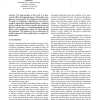1260 search results - page 9 / 252 » Bipolar Preference Problems |
135
click to vote
EAAI
2007
15 years 2 months ago
2007
Multi-agent systems are widely used to address large-scale distributed combinatorial applications in the real world. One such application is meeting scheduling (MS), which is deď¬...
95
Voted
EUSFLAT
2007
15 years 3 months ago
2007
We generalize the solution of a multicriterial optimization problem which has been given in [5]. They have used a comparison of the criterion fuzzy preference relations and the ge...
110
click to vote
NIPS
2004
15 years 3 months ago
2004
Many interesting multiclass problems can be cast in the general framework of label ranking defined on a given set of classes. The evaluation for such a ranking is generally given ...
105
click to vote
AAAI
2004
15 years 3 months ago
2004
Over-constrained problems can have an exponential number of conflicts, which explain the failure, and an exponential number of relaxations, which restore the consistency. A user o...
107
Voted
CEC
2005
IEEE
15 years 4 months ago
2005
IEEE
Abstract- The main purpose of this work is to measure the effect of bargaining players’ information completeness on agreements in evolutionary environments. We apply Co-evolution...



